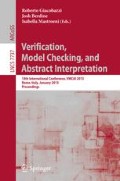Abstract
While soundness captures an essential requirement of the intrinsic approximation of any static analysis, completeness encodes approximations that are as precise as possible. Although a static analysis of some undecidable program property cannot be complete relatively to its reference semantics, it may well happen that it is complete relatively to an approximated and decidable reference semantics. In this paper, we will argue on the ubiquity of completeness properties in static analysis and we will discuss the beneficial role that completeness can play as a tool for designing and fine-tuning static analyses by reasoning on the completeness properties of their underlying abstract domains.
Access this chapter
Tax calculation will be finalised at checkout
Purchases are for personal use only
Preview
Unable to display preview. Download preview PDF.
References
Aarts, C., Backhouse, R., Boiten, E., Doornbos, H., van Gasteren, N., van Geldrop, R., Hoogendijk, P., Voermans, E., van der Woude, J.: Fixed-point calculus. Inform. Process. Lett. 53(3), 131–136 (1995)
Amato, G., Scozzari, F.: Observational completeness on abstract interpretation. Fundamenta Informaticae 47(12), 1533–1560 (2011)
Apt, K.R., Plotkin, G.D.: Countable nondeterminism and random assignment. J. ACM 33(4), 724–767 (1986)
de Bakker, J.W., Meyer, J.-J.C., Zucker, J.: On infinite computations in denotational semantics. Theoret. Comput. Sci. 26(1-2), 53–82 (1983)
Clarke, E.M., Grumberg, O., Peled, D.A.: Model checking. The MIT Press (1999)
Cousot, P.: Méthodes itératives de construction et d’approximation de points fixes d’opérateurs monotones sur un treillis, analyse sémantique des programmes. Ph.D. dissertation, Université Scientifique et Médicale de Grenoble, Grenoble, France (1978)
Cousot, P.: Constructive design of a hierarchy of semantics of a transition system by abstract interpretation. Theoretical Computer Science 277(1-2), 47–103 (2002)
Cousot, P., Cousot, R.: Abstract interpretation: a unified lattice model for static analysis of programs by construction or approximation of fixpoints. In: Proc. 4th ACM POPL, pp. 238–252 (1977)
Cousot, P., Cousot, R.: Systematic design of program analysis frameworks. In: Proc. 6th ACM POPL, pp. 269–282 (1979)
Cousot, P., Halbwachs, N.: Automatic discovery of linear restraints among variables of a program. In: Proc. 5th ACM POPL, pp. 84–97 (1978)
Crafa, S., Ranzato, F.: Bisimulation and simulation algorithms on probabilistic transition systems by abstract interpretation. Formal Methods in System Design 40(3), 356–376 (2012)
Giacobazzi, R., Quintarelli, E.: Incompleteness, Counterexamples, and Refinements in Abstract Model-Checking. In: Cousot, P. (ed.) SAS 2001. LNCS, vol. 2126, pp. 356–373. Springer, Heidelberg (2001)
Giacobazzi, R., Ranzato, F., Scozzari, F.: Making abstract interpretations complete. J. ACM 47(2), 361–416 (2000)
Groote, J.F., Vaandrager, F.: An Efficient Algorithm for Branching Bisimulation and Stuttering Equivalence. In: Paterson, M. (ed.) ICALP 1990. LNCS, vol. 443, pp. 626–638. Springer, Heidelberg (1990)
Henzinger, M.R., Henzinger, T.A., Kopke, P.W.: Computing simulations on finite and infinite graphs. In: Proc. 36th FOCS, pp. 453–462. IEEE Press (1995)
Kildall, G.: A unified approach to global program optimization. In: Proc. 1st ACM POPL, pp. 194–206 (1973)
Miné, A.: The octagon abstract domain. Higher-Order and Symbolic Computation 19(1), 31–100 (2006)
Paige, R., Tarjan, R.E.: Three partition refinement algorithms. SIAM J. Comput. 16(6), 973–989 (1987)
Ranzato, F., Tapparo, F.: Generalized strong preservation by abstract interpretation. J. Logic and Computation 17(1), 157–197 (2007)
Ranzato, F., Tapparo, F.: Computing Stuttering Simulations. In: Bravetti, M., Zavattaro, G. (eds.) CONCUR 2009. LNCS, vol. 5710, pp. 542–556. Springer, Heidelberg (2009)
Ranzato, F., Tapparo, F.: An efficient simulation algorithm based on abstract interpretation. Information and Computation 208(1), 1–22 (2010)
Author information
Authors and Affiliations
Editor information
Editors and Affiliations
Rights and permissions
Copyright information
© 2013 Springer-Verlag Berlin Heidelberg
About this paper
Cite this paper
Ranzato, F. (2013). Complete Abstractions Everywhere. In: Giacobazzi, R., Berdine, J., Mastroeni, I. (eds) Verification, Model Checking, and Abstract Interpretation. VMCAI 2013. Lecture Notes in Computer Science, vol 7737. Springer, Berlin, Heidelberg. https://doi.org/10.1007/978-3-642-35873-9_3
Download citation
DOI: https://doi.org/10.1007/978-3-642-35873-9_3
Publisher Name: Springer, Berlin, Heidelberg
Print ISBN: 978-3-642-35872-2
Online ISBN: 978-3-642-35873-9
eBook Packages: Computer ScienceComputer Science (R0)

